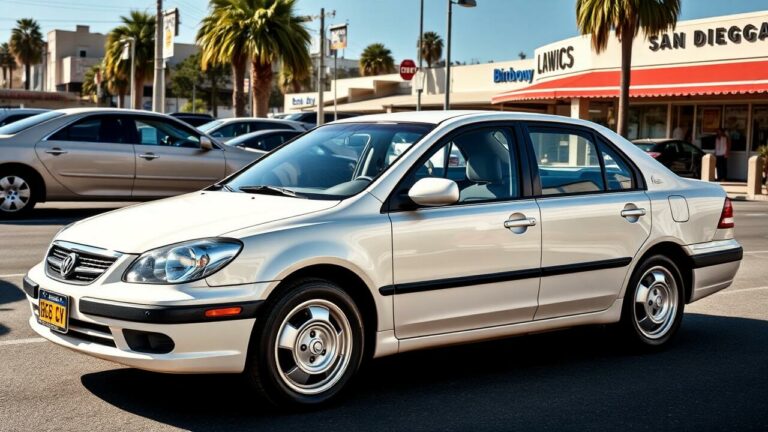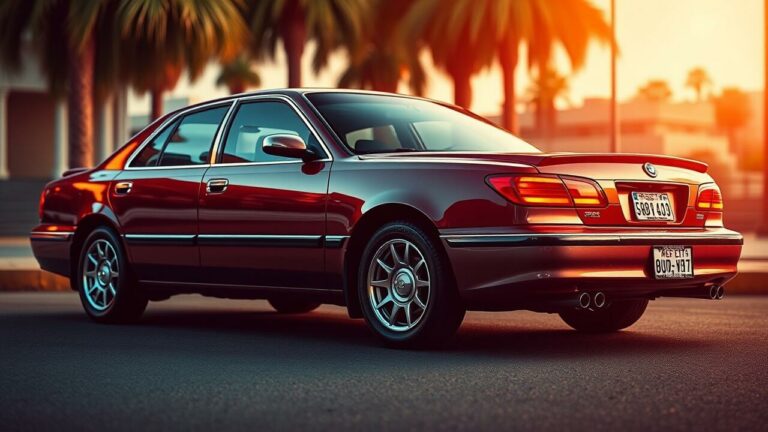Fuel Efficiency: Full size Sedans vs. Compact Sedans
Table Of Contents
Fuel Efficiency: Full Size Sedans Vs. Compact Sedans | Fuel Efficiency Comparison Between Full Size Sedans and Compact Sedans
Key Takeaways
- Comparison of larger and smaller sedan types regarding fuel performance
- Measurement standards for assessing fuel consumption
- Evaluation of fuel economy between larger and smaller sedans
- Benefits of smaller sedans in terms of fuel efficiency
- Benefits of larger sedans in different characteristics
- Buyer choices and industry developments
Fuel Efficiency: Full Size Sedans Vs. Compact Sedans | Overview of Sedans
The discussion surrounding Fuel Efficiency: Full Size Sedans vs. Compact Sedans highlights the distinct characteristics that differentiate these vehicle categories. Full-size sedans provide spacious interiors and enhanced comfort, catering to families and those who prioritize passenger space. Compact sedans, on the other hand, are designed for fuel efficiency, often outperforming their larger counterparts in miles per gallon. Mid-size sedans offer a balance between the two, appealing to consumers seeking a mix of space and economy. The rise of hybrid sedans has further influenced this landscape, offering eco-friendly options that combine technology and efficiency. Understanding these differences is crucial for consumers making informed decisions based on their needs and preferences.
Fuel Efficiency: Full size Sedans vs. Compact Sedans | Definition of FullSize Sedans
Full-size sedans are designed to provide ample space and comfort, often making them a choice for families and business professionals alike. These vehicles typically offer a more powerful engine compared to compact cars and midsize sedans, contributing to an overall larger size and increased weight. While they can provide a luxurious driving experience and superior amenities, their fuel consumption tends to be higher. This aspect is a significant point of comparison in the Fuel Efficiency: Full size Sedans vs. Compact Sedans discussion.
In terms of design, full-size sedans are often equipped with features that prioritize comfort and performance over fuel efficiency. While they may offer advanced technology and spacious interiors, these factors can lead to a decrease in fuel efficiencies compared to compact cars and midsize cars. Consumers balancing the need for space and fuel economy may find that full-size sedans do not always meet their fuel efficient expectations as effectively as some compact cars or even SUVs.
Definition of Compact Sedans
Compact sedans are designed as smaller cars that prioritize fuel efficiency without compromising essential features. These vehicles typically have smaller fuel tanks compared to larger cars, which often results in better fuel economy. The streamlined design and lightweight construction of a compact sedan can enhance its overall performance. They usually accommodate four to five passengers comfortably while offering an efficient alternative to a midsize sedan. Fuel Efficiency: Full Size Sedans vs. Compact Sedans often highlights how these smaller cars leverage their powerplants to maximize horsepower while minimizing fuel consumption.
The appeal of compact sedans lies in their ability to balance size and performance. With a focus on weight reduction, these cars can deliver impressive fuel efficiency figures, making them a popular choice for daily commuters. While larger cars might offer more space and amenities, the compact sedans excel in urban environments where maneuverability and parking ease are advantageous. Vehicle manufacturers continue to innovate in this segment, ensuring that consumers benefit from advancements in technology that improve fuel efficiency. Fuel Efficiency: Full Size Sedans vs. Compact Sedans reflects this growing trend towards efficient, smaller cars in an increasingly eco-conscious market.
| Model | Engine Type | Fuel Efficiency (mpg) | Seating Capacity | Price Range ($) |
|---|---|---|---|---|
| Toyota Corolla | Gas 1.8L I4 | 30 city / 38 highway | 5 | 20,000 – 25,000 |
| Honda Civic | Gas 2.0L I4 | 31 city / 40 highway | 5 | 22,000 – 28,000 |
| Hyundai Elantra | Gas 2.0L I4 | 33 city / 43 highway | 5 | 19,000 – 24,000 |
| Kia Forte | Gas 2.0L I4 | 31 city / 41 highway | 5 | 18,000 – 23,000 |
Fuel Efficiency Metrics
Understanding fuel efficiency is crucial for consumers choosing between vehicle types, particularly in the comparison of full-size sedans versus compact sedans. The fuel pump plays a vital role in optimizing performance, as vehicles equipped with turbocharged engines can often provide better fuel economy than traditional gasoline engines. Small cars, such as those from Honda, typically offer superior fuel efficiency, making them attractive options compared to larger midsize cars and SUVs. This distinction highlights the ongoing preference for economy cars that deliver affordability and sustainability without sacrificing driving enjoyment. Fuel efficiency ratings greatly influence consumer decisions, showcasing how specific features and engine technologies contribute to overall performance in the automotive market.
Understanding Fuel Efficiency Ratings
Fuel efficiency ratings play a crucial role in evaluating the performance of vehicles, particularly in the context of fuel efficiency: full size sedans vs. compact sedans. These ratings often highlight the gas mileage of economy cars, making them a key consideration for consumers. Many people seek sedans with the best fuel economy ratings, including compact sedans that often feature turbocharged engines designed to maximize fuel usage. On the other hand, while full-size sedans may not top the charts for fuel efficiency, they often provide a different appeal in design and comfort.
Understanding these ratings involves looking beyond just numbers. The full-size sedan market typically offers vehicles that prioritize comfort and space, which can sometimes come at the cost of lower fuel efficiency. Comparatively, compact sedans frequently shine in high fuel efficiency, appealing to those who value economy over extra space. Brands like Mercedes-Benz have also entered the compact segment, showcasing how luxury and fuel economy can coexist in modern sedans. This dynamic illustrates the ongoing conversation regarding fuel efficiency: full size sedans vs. compact sedans, helping consumers make informed choices.
Factors Influencing Fuel Efficiency
Several factors are essential in determining the fuel efficiency difference between full-size sedans and compact sedans. The size and weight of the vehicle play a significant role; full-size vehicles tend to be heavier, which can negatively impact their miles per gallon ratings. In contrast, the compact sedan class often features lighter constructions and more efficient engine designs, enabling impressive fuel efficiency that appeals to those seeking fuel-efficient economy cars. Many sedan models in the small luxury sedans category also focus on engineering strategies that maximize fuel economy.
Engine technology is another significant factor influencing fuel efficiency. Full-size vehicles might prioritize power and performance, often at the expense of fuel economy. On the other hand, compact vehicles are designed to deliver better fuel efficiency while maintaining adequate power for everyday driving. Moreover, innovations such as turbocharging and hybrid technologies in the mid-size sedan market play a crucial role in enhancing fuel performance. As consumers increasingly seek a safety-focused sedan ideal, understanding these dynamics becomes vital for making informed choices in the Fuel Efficiency: Full size Sedans vs. Compact Sedans debate.
| Vehicle Type | Average Weight (lbs) | Fuel Efficiency (MPG) | Engine Technology | Typical Use Case |
|---|---|---|---|---|
| Full-Size Sedan | 3,500 – 4,500 | 20 – 25 | V6 / V8, Conventional | Family trips, Performance |
| Compact Sedan | 2,500 – 3,000 | 30 – 40 | 4-Cylinder, Turbocharged | Daily commuting, City driving |
| Mid-Size Sedan | 3,000 – 3,500 | 25 – 30 | Hybrid, Turbocharged | Balanced use, Family and commuting |
| Small Luxury Sedan | 3,200 – 3,800 | 25 – 35 | Turbocharged, Electric Hybrid | Luxury commuting, Performance driving |
Fuel Efficiency Comparison: FullSize Sedans vs. Compact Sedans
Fuel efficiency plays a crucial role in the discussion of full size sedans versus compact sedans, especially considering how these vehicles cater to different consumer needs. While full-sized vehicles often provide comfort and space, they typically do not match the impressive fuel economy offered by their compact car market counterparts. Midsize sedans may bridge the gap, yet they still fall behind the fuel savings seen with sub-compact vehicles that shine in terms of efficiency. Small luxury sedans can also offer modest horsepower while ensuring that economy cars have less space than compact vehicles. Balancing the cost and benefits of these options is essential for buyers looking to maximize their value. Fuel Efficiency: Full size Sedans vs. Compact Sedans ultimately highlights the trade-offs consumers must navigate when choosing between size and efficiency.
Average Miles Per Gallon (MPG)
Fuel efficiency plays a critical role in the choice between full-size sedans and compact vehicles. Compact sedans, such as those offered by Hyundai, typically deliver strong fuel economy, making them ideal for consumers seeking budget-friendly starter cars. Their respective fuel efficiencies often outperform their larger counterparts. While full-size sedans, including midsize luxury sedans, may provide other advantages, they generally do not match the excellent fuel economy found in more compact models.
Car manufacturers are keenly aware of the trends within the suv-dominated market and are adapting their offerings to remain competitive. The fuel efficiency of any vehicle is often highlighted through metrics like miles per gallon (MPG). Compact sedans usually boast industry-leading fuel consumption figures that cater to buyers looking for both affordability and capability. In the ongoing discussion of Fuel Efficiency: Full size Sedans vs. Compact Sedans, compact vehicles continue to carve out a significant niche for themselves in the automotive landscape.
RealWorld Driving Conditions
Real-world driving conditions significantly influence the assessment of Fuel Efficiency: Full Size Sedans vs. Compact Sedans. Many car consumers often find that large vehicles, such as full-size sedans, may not perform as efficiently in everyday situations like urban driving or stop-and-go traffic. These conditions can lead to higher fuel consumption, causing sport sedans, including entry-level options, to sip fuel with efficiency while still delivering a satisfying driving experience. As drivers encounter varying road conditions, the practical fuel economy ratings of these vehicle types become essential in choosing the right car.
Compact cars offer notable advantages in urban environments and congested traffic, where their lighter weight and maneuverability shine. They typically excel in fuel efficiency, with the potential to outperform mid-size vehicles in fuel economy ratings. On the other hand, expensive vehicles like full-size sedans may provide a more spacious interior and enhanced comfort but might not match compact sedans in terms of day-to-day fuel efficiency. This comparison highlights the importance of considering real-world driving conditions when evaluating Fuel Efficiency: Full Size Sedans vs. Compact Sedans.
Advantages of Compact Sedans in Fuel Efficiency
Compact sedans are increasingly recognized for their fuel efficiency, particularly in the context of Fuel Efficiency: Full Size Sedans vs. Compact Sedans. Equipped often with smaller engine sizes, such as four-cylinder powerplants, these vehicles offer a balance of power and economy that many car owners appreciate. Unlike their larger full-size counterparts, which may prioritize high-performance driving and comfort, compact sedans focus on minimizing inferior fuel economy that can come with heftier engine specs. New car models in this category often prioritize efficiency without sacrificing the driving experience, making them a popular choice among economy vehicles. As the automotive market evolves, even performance-oriented brands, including reputed German sedans like performance BMW models, are recognizing the importance of efficiency, thus reflecting changing consumer preferences where vehicles that increase costs through poor fuel economy become less desirable.
- Compact sedans are generally lighter than full-size sedans, contributing to better fuel efficiency.
- Their smaller engines typically consume less fuel, leading to lower operational costs.
- These vehicles often come with advanced technology designed to enhance fuel economy.
- Many compact sedans offer hybrid options, further improving their efficiency.
- They have smaller fuel tanks, which means they require less fuel for trips compared to larger cars.
- Compact sedans often have better aerodynamics, reducing drag and improving mileage.
- Owners of compact sedans often experience lower emissions, making them more environmentally friendly.
Design and Weight Considerations
Design plays a crucial role in the fuel efficiency debate between full-size sedans and compact sedans. Compact vehicles, like the compact Kia, are often designed with lighter materials, which significantly reduce overall weight. This lightweight design directly impacts gas consumption, allowing these economy vehicles to achieve higher miles per gallon (MPG). The aerodynamic shapes of compact sedans also contribute to less drag, making them ideal for those seeking a true economy car that meets their automotive needs.
Weight considerations further enhance the advantages of compact sedans over their full-size counterparts. A compact sedan, typically a 5-seater vehicle, is engineered to maximize efficiency without compromising comfort. While full-size sedans offer spaciousness, the heavier build can negatively affect fuel efficiency. For individuals prioritizing fuel economy, the right car choice often leans towards compact options, which provide a combination of practicality and lower fuel consumption, making them appealing in the context of Fuel Efficiency: Full size Sedans vs. Compact Sedans.
Engine Efficiency and Technology
Fuel efficiency often becomes a critical factor for new-car shoppers exploring options like a compact Hyundai or a full-size sedan. Compact models typically utilize a modest base engine that prioritizes fuel economy without sacrificing the essential performance needed for daily driving. With advancements in technology, many sport sedan CVTs enhance efficiency while providing the power desired by drivers. Such technologies can result in compact rates that outperform their larger counterparts, particularly in urban settings where frequent stop-and-go traffic can affect overall fuel consumption.
Full-size sedans, while equipped with more powerful engines, may offer a trade-off in fuel efficiency. However, advancements in fuel management systems and hybrid options have allowed these vehicles to become more functional and appealing to those who prioritize rear passenger space and comfort. The balancing act between fuel efficiency and performance engines showcases how different models cater to diverse consumer needs. New-car shoppers are encouraged to explore the latest options in both segments to make informed choices that best fit their lifestyle.
Advantages of FullSize Sedans in Other Aspects
Full-size sedans offer notable advantages beyond fuel efficiency, making them a compelling choice for many car buyers. With their spacious interiors, these vehicles provide combined passenger comfort that is often unmatched by compact options. Many full-size sedans, including those in the Mercedes-Benz lineup, come equipped with turbo options that enhance performance without compromising on modern efficiency. Although fuel efficiency may be a point of comparison between full-size sedans and compact Hyundai options, the ability to navigate short trips with a full tank and the flexibility of multiple engine options can outweigh considerations of gas prices for some consumers. These factors contribute to a broader understanding of the economy car equation, showcasing the diverse appeal of full-size sedans.
- High resale value due to brand reputation and demand
- Enhanced safety features that provide better protection for passengers
- Advanced technology and infotainment systems for a better driving experience
- Larger trunk space, accommodating more luggage and gear for travel
- Smooth and comfortable ride quality, ideal for long-distance drives
- Stylish designs that cater to a wide range of personal aesthetics
- Availability of luxury trims and options, allowing for a more personalized vehicle experience
Comfort and Space
Full-size sedans typically offer more comfort and space compared to their compact counterparts. The larger dimensions allow for more generous legroom and headroom, making them ideal for families or individuals who prioritize comfort in their vehicle purchase journey. Many full-size models come equipped with new base engine options that provide a balance between efficiency and engine power. While they may not match the fuel economy of compact sedans, these vehicles often feature city-friendly engines that enhance the overall driving experience.
Compact sedans have gained popularity due to their efficiency and nimble handling, but many drivers still appreciate the generous space found in full-size vehicles. The advantages of a turbo option in certain larger sedans enable better performance without compromising on comfort. For particular drivers seeking a spacious interior and advanced features, full-size sedans remain a compelling choice in the ongoing discussion of Fuel Efficiency: Full size Sedans vs. Compact Sedans. Car subscription services are increasingly accommodating this preference, allowing consumers to enjoy the benefits of spacious sedans without long-term commitments.
Performance Features
Full-size sedans often provide a lavish driving experience that appeals to consumers seeking comfort and performance. Many automakers design these vehicles with spacious passenger volume and a focus on high-end features. While compact models, including sub-compact models, prioritize fuel efficiency, full-size sedans can integrate powerful economy engines that enhance performance without sacrificing too much on MPG. This balance allows some full-size sedans to achieve impressive top speeds, making them a worthy contender in the discussion of Fuel Efficiency: Full Size Sedans vs. Compact Sedans.
The performance features of full-size sedans can also extend into the realm of driving dynamics, where they excel in stability and handling, particularly at higher speeds. Racing-inspired technology may be incorporated into their design, allowing for a thrilling drive. Vehicle inventory for full-size sedans increasingly reflects this blend of efficiency and exhilarating performance. As a result, consumers can enjoy not only the practicality of a spacious vehicle but also engage in an enjoyable driving experience that rivals that of sporty compact models.
Consumer Preferences and Market Trends
Shifts in consumer preferences are increasingly impacting the market dynamics between full-size and compact sedans. Drivers are often drawn to vehicles like the well-regarded Chevrolet Cruze and the reliable Hyundai Elantra due to their superior fuel efficiency, which allows them to travel further on fewer gallons of gas. The emphasis on reducing emissions and enhancing the rental car experience has also led many towards compact sedans as a more utilitarian vehicle option. On the other hand, full-size sedans continue to attract buyers who prioritize comfort within a spacious passenger compartment. The price difference between these vehicle categories can influence driving preferences, making compact sedans a popular choice among budget-conscious consumers in rental car hubs across the country. Fuel efficiency remains a key factor in this evolving landscape of consumer demand, particularly in the context of Fuel Efficiency: Full Size Sedans vs. Compact Sedans.
Shifts in Consumer Demand
Consumer preferences have evolved significantly in recent years, reflecting a growing focus on sustainability and efficiency in the automotive market. As discussions about Fuel Efficiency: Full Size Sedans vs. Compact Sedans gain traction, buyers are increasingly drawn to compact vehicles that offer both lower emissions and superior gas mileage. The weight difference between full-size and compact sedans plays a vital role in this shift. Compact sedans often deliver an enjoyable driving experience while maintaining high-performance capabilities, making them attractive options for consumers looking for a transportation upgrade.
Car news highlights the rise of hybrid versions of compact sedans, which cater to urban dwellers seeking efficient solutions for their city drive. Drivers can enjoy the benefits of a single tank filling while being conscious of fuel consumption during their daily commutes. The driving experience offered by these vehicles, coupled with the financial advantages of improved fuel efficiency, has influenced many to reconsider their choices in the Fuel Efficiency: Full Size Sedans vs. Compact Sedans debate. As the market trends evolve, manufacturers must adapt to meet the needs of a more environmentally conscious consumer base.
Environmental Considerations
Increasing awareness about environmental impacts has led to a shift in consumer preferences toward vehicles that offer better fuel efficiency. Compact sedans, like the Volkswagen Jetta, deliver impressive mileage and contribute to lower emissions compared to larger models. First-time drivers often gravitate towards these smaller vehicles due to their agile handling and practicality. The combination of size and efficiency makes compact sedans a preferred choice for those looking to minimize their carbon footprint.
Luxury vehicles, on the other hand, are also adapting to these environmental concerns. The Volvo S60 Recharge, a hybrid model, showcases how full-size sedans can embrace eco-friendly technologies without sacrificing comfort or cargo volume. While they tend to offer more space and rear passenger comfort, the challenge remains for these larger sedans to match the fuel efficiency showcased by their compact counterparts. As the market evolves, a balance between luxury and environmental responsibility continues to be a key consideration for consumers.
Conclusion
The debate on fuel efficiency between full-size sedans and compact sedans highlights key differences that influence consumer choices. Full-size sedans often come with a higher price point, reflecting their enhanced comfort and performance features. However, the compact segment has gained traction due to its superior fuel efficiency, making them more appealing for budget-conscious buyers. Understanding fuel efficiency metrics is crucial for consumers as they weigh the advantages of spaciousness against the benefits of savings at the pump. The Fuel Efficiency: Full Size Sedans vs. Compact Sedans comparison ultimately helps guide decisions in a market increasingly focused on environmental considerations and cost-effectiveness.
FAQS
What are some advantages of full-size sedans over compact sedans in terms of fuel efficiency and space?
Full-size sedans often provide more interior space, which makes them a comfortable option for those seeking a vehicle for family trips or daily commuting. These vehicles can also be equipped with fuel-efficient turbo engines or hybrid models, offering impressive fuel savings compared to their mid-size car counterparts. While the full-sized vehicle—the cost associated with larger cars might be higher, the benefits include better performance and more options for features. Furthermore, a mid-size sedan may provide a balance between the good fuel economy of a compact car and the spaciousness of larger vehicles, making it a top choice for buyers who prioritize both comfort and efficiency.
How do features of mid-size cars compare to compact cars when considering the overall functionality as a daily vehicle?
Mid-size cars, such as certain Hyundai sedans, offer more space and comfort compared to their compact car counterparts. While a compact car offers better fuel savings and may be more suitable for short-trip vehicles, mid-size sedans like the Volkswagen Jetta delivers a balance of comfort and functionality. Additionally, the entry-level sport sedans often provide a better base engine isn with small displacement engine options, allowing for a more versatile driving experience than a typical big car affords. However, it’s important to consider how these vehicles increase costs when choosing between vehicle options, especially for those who require a more spacious and functional vehicle for daily use.
How do coupe models compare with their midsize sedan counterparts in terms of fuel efficiency for daily vehicles?
When considering fuel efficiency, coupe models generally tend to have better rates than their midsize sedan counterparts. However, the specific performance can vary widely depending on the model, such as a Hyundai vehicle or a designer city car. Additionally, for those who prefer options like sedan AWD automatic, the fuel efficiency might be less optimal. Ultimately, the choice between a coupe and a midsize sedan for a daily vehicle will depend on individual preferences and requirements.
How do designer city cars rate compared to full-size sedans and compact sedans in terms of fuel efficiency, especially for those looking to own a vehicle?
Designer city cars often rate well when compared to full-size sedans and compact sedans in terms of fuel efficiency, particularly for urban driving. They typically offer lots of convenience features and can be more economical to maintain, allowing owners to have a stylish and practical option when choosing their own vehicle. Models like the gran coupe also bridge the gap between performance and efficiency.
How do reviewers typically rate vehicles like full-size sedans and compact sedans for their overall performance?
Reviewers often rate vehicles on criteria such as fuel efficiency, comfort, and reliability. Full-size sedans might receive higher ratings for space and comfort, while compact sedans may excel in fuel efficiency and maneuverability, making them appealing for city driving.







